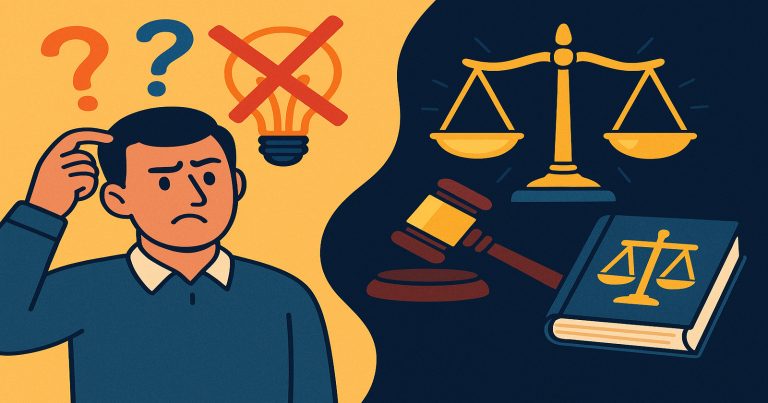Contracts form the basis of interactive business and legal relations. However, what happens if one or both parties have agreed on the wrong impression? That is when the concepts of mistake of fact and mistake of law become meaningful; the two doctrines will largely determine whether an agreement is to be held valid or voidable. Thus, distinguishing between mistakes of fact and mistakes of law is essential, for it establishes the enforceability of contracts and saves a party from impending legal doom. This article will discuss the various manifestations of these two kinds of errors, their bearing on free consent under business law, and their input towards contract validity.
What is Mistake in Fact and Mistake of Law?
A Mistake of Fact occurs when one or both parties enter a contract under a misunderstanding about a material fact essential to the agreement. This may involve the nature of the subject matter, the identity of the person, or the existence of a specific condition. For example, if both parties believe a piece of land is 5 acres, but it’s only 3 acres, that’s a mistake of fact.
A Mistake of Law, however, involves a misunderstanding of the legal rules or rights applicable to the agreement. In most cases, courts do not allow rescission of contracts based on a mistake of law because the principle “ignorance of the law is no excuse” applies. However, some exceptions exist, such as being misled by a government authority.
The distinction between these two types of mistakes is critical. While an error of fact may render a contract voidable, a mistake of law generally does not unless certain exceptions apply.
Free Consent in Business Law
Free consent in business law means that all parties entering into a contract mustand in alignment with the essential elements of a valid contract, such as capacity to contract, lawful object, and genuine agreement.”. For consent to be free, it must be genuine and informed. Free consent is compromised in the following situations:
- Coercion—Using force or threats to get someone to agree to a contract.
- Undue Influence—Exploiting a position of power to gain an unfair advantage.
- Fraud—Intentionally deceiving another party to enter into a contract.
- Misrepresentation—Giving false or misleading information without intent to deceive.
- Mistake—Either an error of fact or law can affect the validity of consent.
Consent is the cornerstone of contract law and must meet the essential elements of a valid contract. If any of the above vitiate consent like coercion in contract law or fraud in contract law vitiate consent, the contract becomes voidable at the option of the aggrieved party. In most cases, a mistake of fact can be a valid reason to cancel a contract, but an error of law generally cannot unless exceptional circumstances apply.

Examples of Mistake of Fact and Mistake of Law
Mistake of fact and mistake of law are two crucial concepts within legal studies, and they define actions under criminal law and contract law. These legal mistakes greatly affect the case outcome; hence, students, legal practitioners, and aspirants of the law must know the real-life applicability and implications of these terms. A mistake of fact surely describes a scenario in which a person misunderstands or is ignorant of the fact that negates criminal intent. In contrast, a mistake of law refers to misinterpreting the appropriate legal rules or obligations.
Mistake of Fact Example
Imagine a seller and buyer agreeing to sell a painting, both believing it’s an original. Later, they find out it is a replica. Since both were mistaken about a crucial fact, this is a mutual mistake of fact, and the contract can be declared voidable.
Mistake of Law Example
A business owner signs a contract without realizing that a specific tax law applies to the transaction —a classic case of a mistake of law, which does not void the contract under the legal environment in business. Their misunderstanding of tax obligations is a mistake of law, and typically, this does not make the contract voidable.
Cross-Topic Bridge Example
In partnership agreements, especially those involving the admission of a partner, any error in understanding the financials or obligations may lead to a mistake of fact, potentially requiring revaluation or contract reformation.
Honest and Reasonable Mistakes
There are times when someone makes a genuine error with good intentions. This is called an honest and reasonable mistake. Courts sometimes consider this, especially in regulatory or criminal cases, where a person believed they were acting lawfully.
Scenario: A shopkeeper sells an item at an incorrect price due to a label printing error. The shopkeeper had no intent to mislead. Even though it’s a mistake of fact, it was honest and reasonablewhich may be examined through the lens of the doctrine of caveat emptor in commercial contracts.
However, honest and reasonable mistakes do not always provide a legal remedy in contract disputes. The law requires a deeper look at whether the error affected the core of the agreement.
Legal Consequences of Mistake of Fact vs Mistake of Law
The legal consequences of these two types of mistakes are different and carry significant weight in court decisions.
Mistake of Fact can make a contract:
- Voidable—if the error affects the fundamental basis of the contract.
- Void—If the error is about the existence of the subject matter (e.g., selling a car that no longer exists).
Mistake of Law generally:
- Does not constitute a ground for invalidating a contract.
- There may be exceptions in cases where the error relies upon some official misguidance or wrong advice from a tax authority.
Understanding these consequences is essential for both companies and individuals. It helps to enter into contracts with proper awareness, thus avoiding any disputes in the future.
Importance of Free Consent and Mistakes in Contracts
Free consent and mistakes in contracts are deeply connected. If a person enters a contract without knowing the truth about essential facts or due to a misunderstanding of the law, it may impact the legal standing of the contract.
The law assumes parties are entering into a contract with complete understanding. But when a mistake of fact disrupts that understanding, the foundation of the contract becomes weak. Courts are more sympathetic toward genuine factual errors than legal ignorance.
Consent tainted by a mistake of fact might not reflect the actual intention of the parties. That’s why such contracts are given legal remedies like rescission or reformation. However, legal systems are less likely to grant relief for mistakes of law, as the burden is on the individual to know the law.
Mistake of Fact and Mistake of Law FAQs
Define a mistake of fact and a mistake of law.
A mistake of fact is a misunderstanding of a material fact relevant to the agreement. An error of law involves ignorance or misinterpretation of the legal rules applicable to the contract.
Can a mistake of law invalidate a contract?
Generally, no. A mistake of law does not invalidate a contract, except in rare cases where official authorities provide incorrect legal advice.
What is free consent in business law?
Free consent in business law means the agreement of parties to a contract without coercion, undue influence, fraud, misrepresentation, or mistake. It ensures the contract is fair and legally binding.
Give an example of a mistake of fact.
If both parties believe they are trading an original painting and later discover it’s a replica, that is a mutual mistake of fact. The contract may be voidable.
What is an honest and reasonable mistake?
It is a genuine misunderstanding made in good faith based on incorrect information. It is often considered in regulatory cases but does not always make contracts voidable.


